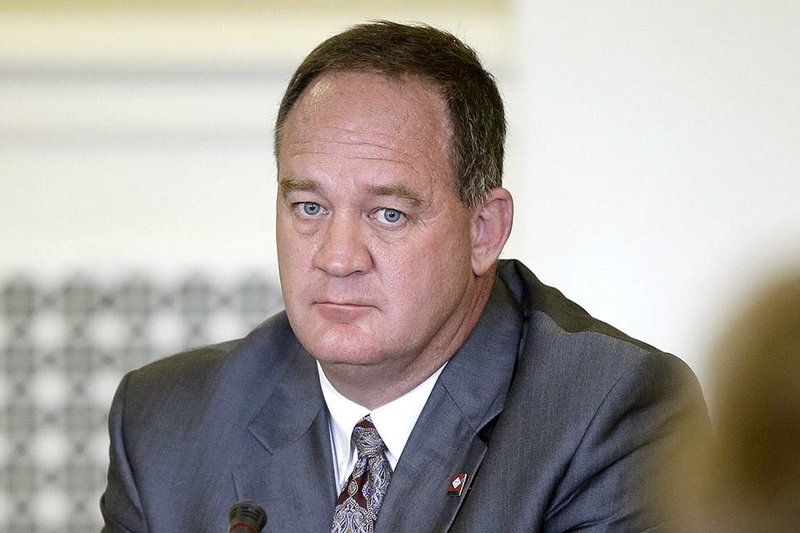The Arkansas Scholarship Lottery's ticket revenue slipped by $6.2 million last quarter from the same three-month period last year to $93.2 million as a result of a drop in draw-game ticket sales, lottery records show.
The amount that the lottery raised for college scholarships dipped by $1.7 million in the quarter that ended Sept. 30 from the same period last year to $15.5 million.
Ticket-sale revenue and net proceeds for college scholarships have declined in each of the past two fiscal years, prompting the Legislative Council last month to hire a consultant at the request of state Sen. Jimmy Hickey, R-Texarkana, to review the lottery and make recommendations to improve its operations.
The consultant, Camelot Global Services of Philadelphia, is aiming to complete its study by the first week of December, Hickey said Wednesday. Camelot Global Services will be paid $149,500, plus up to $20,000 in travel reimbursements, under its contract.
The commission received two proposals from consultants to conduct a separate study; no decision has been made about that study.
The lottery started selling tickets on Sept. 28, 2009.
During its first five years, the lottery sold $2.25 billion in tickets, paid out $1.41 billion in prizes and raised $457.5 million for scholarships.
It's helped finance Arkansas Academic Challenge Scholarships for more than 30,000 college students during each of the past four fiscal years.
The state Department of Higher Education projects it will distribute Arkansas Academic Challenge Scholarships totaling $103 million to 37,582 students in fiscal 2015. These scholarships are financed from the lottery's net proceeds, plus $20 million a year in state general revenue.
A combination of ticket sales lagging behind initial projections and more students than projected receiving scholarships has prompted the Legislature to twice trim the size of the scholarships for future recipients.
When he campaigned for a constitutional amendment to create the lottery in 2008, then-Lt. Gov. Bill Halter estimated it would raise about $100 million each year for scholarships, nearly twice the $55 million projected by the state Department of Finance and Administration.
The actual amounts have ended up being somewhere in between.
In fiscal 2012, net proceeds peaked at $97.5 million. They dropped to $90.2 million in fiscal 2013 and to $81.4 million in fiscal 2014. The lottery projects its net proceeds will be $78.2 million in fiscal 2015, which started July 1.
To help reverse the decline in ticket sales and net proceeds, lottery officials proposed adding electronic monitor games such as keno, a move opposed by many legislators.
In its special session in July, the Legislature enacted Hickey's proposal barring the lottery from adding the games before March 13 to enable lawmakers to determine the future of the games in next year's legislative session.
During the most recent quarter, the lottery's scratch-off ticket-sale revenue increased by $1 million (1.4 percent) over the same period last year to $76.5 million, according to lottery records.
But the draw-game ticket revenue dropped by $7.3 million (30.7 percent) from the same period last year to $16.4 million.
Lottery spokesman Patrick Ralston said the draw-game ticket sales declined compared with the same quarter a year ago because the largest jackpots for both Powerball and Mega Millions were smaller this time.
Powerball ticket sales soared in September 2013 when the jackpot reached $400 million.
"The higher the jackpot, the more excitement and ticket sales, and we simply have not had one of this magnitude in the first quarter of fiscal year 2015," Ralston said.
The lottery's other revenue, including retailer fees, increased by about $9,204 last quarter from the same period last year to $157,247.
The net proceeds declined to $15.54 million last quarter from $17.31 million during the same three-month period last year, according to the lottery's records.
Ralston said the scratch-off ticket sales have gradually crept up and that's encouraging.
Last month, state Rep. Kim Hammer, R-Benton, asked the lottery to pay for half of Camelot Global Services' $149,500 study, saying the report will benefit the agency, too.
The request is still being weighed.
"Once the Lottery Commission adds it to a meeting agenda, it will come up for discussion, and a decision can be rendered," Ralston said. The commission didn't discuss the matter during its meeting last week in Pine Bluff, he said.
Sen. Robert Thompson, D-Paragould, co-chairman of the Legislature's lottery oversight committee, said he's seeking the consultant's advice about whether the lottery could improve its operations and turn around "its seemingly continuing decline" in ticket sales and net proceeds or whether "that is something that we should get used to."
A section on 10/23/2014

